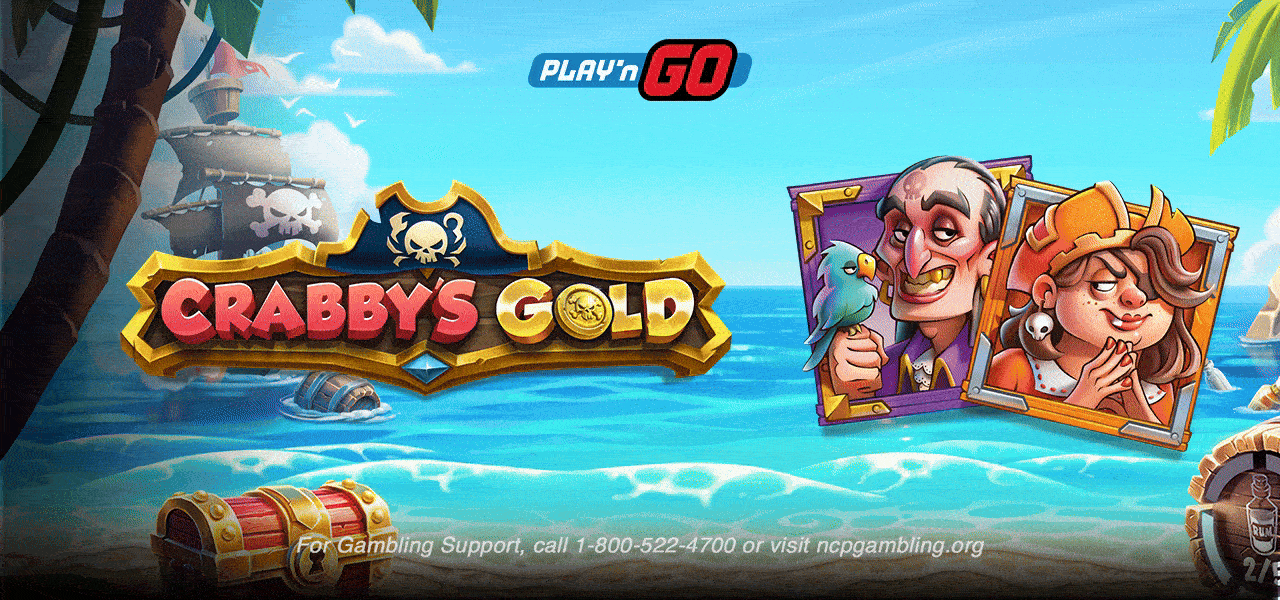Interviews
Interview: Juice Reel’s CEO on how its bet tracking tool and Crowdsourced Insights is elevating the experience for data-driven bettors
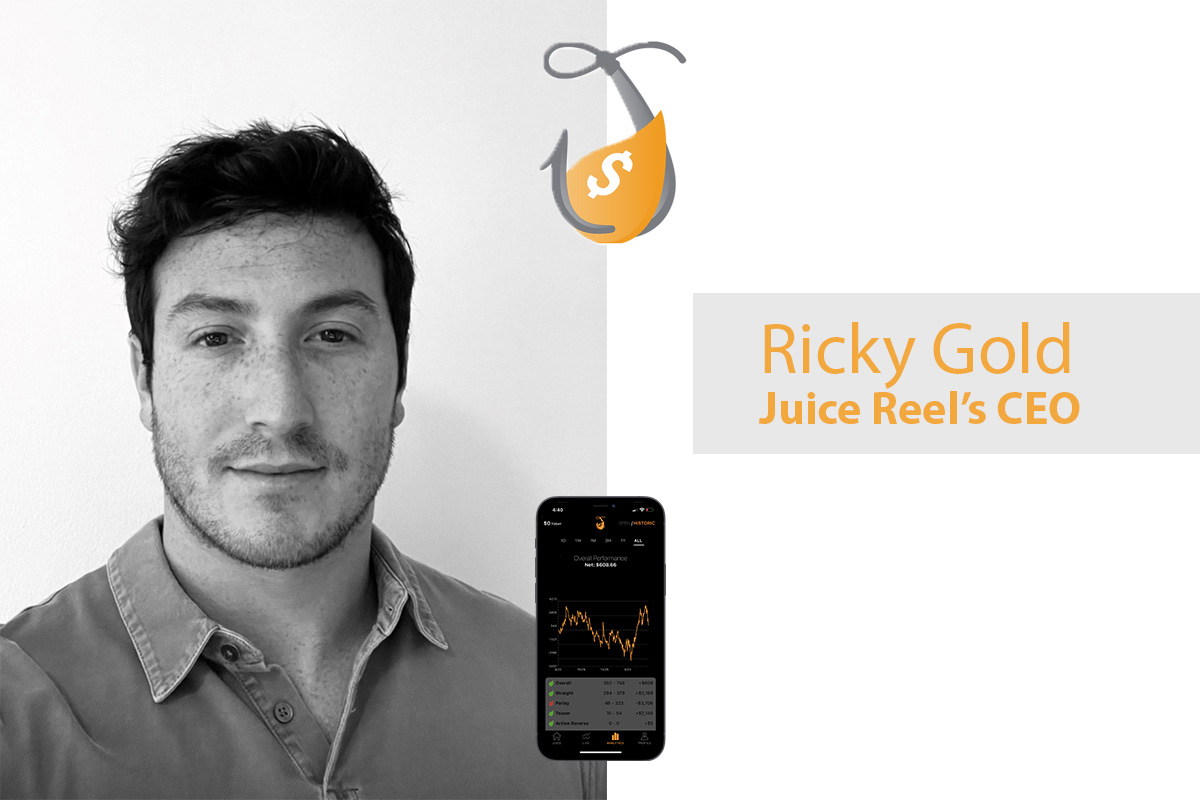
Juice Reel is on a mission to become the ultimate ecosystem for the modern sports bettor. With its mobile app synced to 250+ sportsbooks, the data it collects is unprecedented and has become a must-have tool for bettors looking to make better wagering decisions.
For sportsbooks, Juice Reel is now an effective acquisition and retention engine. Not only does the app drive users to place bets with regulated operators, the company’s new subscription-based Crowdsourced Insights is delivering valuable insight that data-driven bettors crave.
Gaming Americas spoke to Ricky Gold, CEO of Juice Reel, to learn more about the company’s model, how its range of features work, and what the future holds for sports betting in the US.
For those new to Juice Reel, can you explain how your bet tracking and analytics tool works exactly and the reasoning behind developing such a product?
The Juice Reel app allows sports bettors to automatically link in any betting platform or website within seconds, instantaneously uploading their open and historic bets to the platform. Juice Reel offers useful analytics to our users and while this data-syncing automation is convenient for them, we want to support the wider betting industry as well and provide value to sportsbooks. The data we are accruing is not bounded by any market or operator, so essentially, we are establishing a complete understanding of bettors that use the Juice Reel app. This allows us to leverage this understanding and user-data in order to support sportsbooks in the most efficient way, allowing them to maximize player retention and acquisition.

How is the tool unique compared to other solutions available within the market?
From the bettor’s perspective, no tool on the market is really comparable when it comes to bet tracking and analytics. It all starts with a sportsbook-agnostic automation, our platform is allowing users to connect with over 250+ sportsbooks, effectively ending the era where users had to manually type bets one by one or keep spreadsheets. Once we leverage and repackage the data synced onto our app, we are able to create useful and actionable insights for users that cannot be found outside of Juice Reel. Furthermore, we are working on evolving Juice Reel so that it can be more than just a tool used for tracking and insights, instead becoming a centralized bet-placing platform. Our insights help users decide what to bet on, but then the question arises “with which sportsbook do I place the bet with”. We want to help our users find the best sportsbook to place their bet on, one that perfectly matches each user according to the data and insights we collect.
This key feature is how Juice Reel helps sportsbooks, and more than just bringing operators a new bettor that hasn’t signed up with them yet, Juice Reel will expand the lifetime value that a player is worth to a sportsbook. This is done by our platform initiating bets – our insights, particularly real-time live betting insights, will prompt a user to place a bet that they may have not placed if they were betting without the help of Juice Reel. When our insights are producing a bet that wouldn’t have been initiated without our platform, this effectively grows the total addressable market withing the sports betting industry. Ultimately, if through our features a user bets more than they would’ve, then this expands the industry as a whole.
For bettors, how easy is it to register their bets into the app? Can they seamlessly place bets through the app too?
Connecting your sportsbook into Juice Reel takes about one minute. It’s incredibly simple, straightforward, and most importantly, you only have to connect the sportsbook once. This allows the user to continue where they left off the day before, ensuring they experience a seamless long-term betting environment.
Users today can’t place bets directly though our app, but we are looking to expand on this by implementing a feature which could speed up this process. In the near future, if a user clicks a bet/insight it will automatically pop open the respective sportsbook app and pre-load the exact bet you were looking at. This is yet another example of how we help sportsbooks, by bringing them more betting volume.
Just how important is the tracking tool from a responsible gambling perspective? Does the tool only work alongside regulated sportsbooks in legalized markets?
Reducing unregulated gambling and promoting responsible play is at the core of Juice Reel’s ethos, this is reflected not only in our features, but also in our business model. Juice Reel users can upload betting data from both regulated and unregulated platforms. While Juice Reel has no deals with any unregulated platform, we aggregate data from as many sources as possible in an effort to drive users to sign up and place bets solely with regulated operators. Juice Reel never promotes or facilitates illegal gambling, and our business model is designed in a way to capitalize off the ability of directing users and their bets to regulated platforms.
Providing users with a seamless and automated bet tracker gives users a comprehensive understanding of their betting habits and their profit/loss across all the platforms. Empowering users with this information is at the core of what it means to gamble responsibly, we’re allowing sports bettors to clearly see and analyze their spending habits, as well as pointing out unsuccessful betting patterns.
Tell us more about Crowdsourced Insights? How does the subscription service work?
An entire industry exists around “following the smart money” and data-driven bettors are always looking to figure out what team the “sharps” are betting on, such as professional bettors or those with long track records of success. There is a massive flaw in how bettors are deducing where the sharp or smart money is – they automatically assume that if there’s a lot of money and a lack of people betting on one particular side of a game, this must be where the easy money is. It’s important to note that big bettors don’t necessarily mean smart bettors, historical performance is the only barometer to determine a bettor’s overall performance.
Due to the fact that users sync in all of their betting data, Juice Reel can clearly identify which players are historically profitable bettors and which are failing to bet successfully. By using the betting data each user has synced in, Juice Reel is able to analyze and package the data into actionable insights. One example unique to Juice Reel is that for a given game, Juice Reel can show subscribers what side of a game the top 10% historical performers are on and what side the bottom 10% performers are on. So, in a case where historical winners and losers are betting different sides of a game, subscribers can tail profitable bettors.
Finally, in what ways do you envisage the tool to evolve over the coming months and years? Will you add any new features to the ecosystem?
With the industry mindset slowly evolving from an ‘acquire bettors at all costs’ mentality to one where there’s a focus on customer retention and betting volume, Juice Reel is at the forefront of that industry shift and primed to be a major beneficiary of this future macroeconomic change. Juice Reel is evolving from being a bet tracking tool to being an actionable betting platform. Without revealing too much, all of our future features will be designed to reward users and create value for bettors, while also driving players and betting handle to regulated sportsbooks.
We want to bring an Expedia-meets-Robinhood-like experience for both pre-game and in-play betting. We want users to use Juice Reel so they can be informed and supported in regard to everything related to sports betting. We want them to use the app in order to decide what to bet and with whom to place the bet with. Whilst also following their bets through a game and placing live bets using our Live Value feature. By recycling the betting data into insights, we can reward users for contributing their betting activity to the community, thus creating a sports-betting ecosystem that sees everyone playing in a sustainable, supportive, mutually beneficial and safe environment.
Interviews
Review Fatigue Is Real: How to Make Casino Comparisons Clear, Honest, and Human

Sebastian Jarosch is the founder of Mithrillium Media Ltd, and a very famous figure in the iGaming industry. His contributions to the market have been immensely influential. Jarosch has overlooked several projects relating to the online gambling market, most notably those involving affiliates. Because of his past works, we believe he is uniquely qualified to address the topic of Review Fatigue, that seem to be plaguing the industry right now.
Actions speak louder than words. And Jarosch’s actions have earned him several of the most notable industry awards. Among the most notable are the Casinomeister 2020 Awards for Best Casino Group, the AskGamblers Awards for Best Partner in 2021, and the Affpapa Awards Affiliate Programme of the Year 2022.
Interview Questions:
What is “review fatigue,” and why do you think it’s becoming a growing issue in the iGaming space?
Review fatigue happens when players are faced with repetitive, overly long, or generic content. With so many casinos offering similar bonuses, games, and licensing, users quickly lose interest if every review sounds the same. Many reviews lack real insight and simply list features without context, often sounding too good to be true. As a result, players tend to skim or move on entirely, especially if they’ve already seen the same structure and wording on multiple other sites.
How can overly technical or overly promotional content alienate users instead of helping them?
When content is too technical, it can confuse or intimidate newcomers. Ideally content is educational and written with the player in mind. On the flip side, a sales pitch feels dishonest, especially to experienced players who know what to look for. Users are looking for clarity and guidance, not marketing sugar coated casinos. If a review sounds like it’s trying to sell rather than help, it erodes trust immediately. Players want transparency, real pros and cons, not just buzzwords.
What are the most important things players want to see in a casino comparison, and what can we safely leave out?
Players want to know the promotions, payment methods, withdrawal speeds, licensing, game variety, and reliability of a casino. They also care about things like support quality, KYC, ownership, RTPs, and real player feedback. What they don’t want is generic content that could apply to any casino and offers no real value. Sites like Casino-Groups help players pick the right casinos based on individual preferences.
How do you balance clarity with completeness when writing or designing reviews?
It’s all about prioritizing information and guiding the reader. We aim to answer the most important user questions right at the beginning, often using summary tables to make things easier to digest. More detailed information comes later for those who want to dive deeper. It’s important to avoid walls of text and explain complex terms in plain language. The goal is to give users exactly what they need to know, without bombarding them with unnecessary information.
Do players trust shorter, more digestible content more than long-form reviews today? Why or why not
Shorter content tends to convert better because users find what they’re looking for quickly, without digging through long paragraphs full of filler. Dense, meaningful content with no waste often performs best. A short, clear, and well-structured review can build more trust than a long one filled with fluff. That said, some players do enjoy longer reviews, especially when they’re broken up with visuals, clear sections, and genuinely useful insights.
What role does tone of voice play in making reviews feel more human and less “salesy”?
A review should feel like it’s written by a real person who’s an expert in the field, not by ChatGPT or a salesperson. We use conversational language where possible and speak directly to the user. If something’s bad or a bonus is just average, it needs to be mentioned. That kind of honesty builds far more credibility than flashy design or empty buzzwords.
How do you verify and present information (e.g., licensing, terms, payment speed) in a way that’s both accurate and user-friendly?
We manually verify everything by signing up, testing support, and reading the fine print. We also check licenses through official registries and monitor user feedback on watchdog sites. To present the information clearly, we use tables, lists, screenshots, and both internal and external links to relevant pages. All our reviews follow a consistent format so players know what to expect and can easily find the details they need.
Have you experimented with visual elements like comparison tables, badges, or rating meters to reduce cognitive load?
Pictures speak a thousand words and help break up content into smaller, more digestible sections, reducing review fatigue. We use comparison tables for things like bonus terms, game selection, and payment methods. Every review includes a rating, and we apply badges to highlight our top casinos. This makes it easier for users to compare options at a glance and make smarter decisions with less effort.
What strategies do you use to keep review formats consistent while still personalizing the experience for different user types?
We follow a consistent structure that works well for both SEO and conversions. However, if a specific area needs emphasis or additional context, we’re happy to deviate from our standard format to ensure topical completeness. Some casinos offer unique features that deserve extra attention, and in those cases, we’ll add dedicated sections. The framework is consistent, but we stay flexible where it counts.
Looking ahead, how do you think casino reviews will evolve to meet changing user expectations and attention spans?
We’ll see more interactivity, personalization, and smarter use of data. Reviews could adapt in real time based on user preferences, highlighting crypto options for one user and game selection for another. AI chatbots may help users find the best match and answer questions about a casino instantly. Integration with platforms like Discord or Telegram where players can exchange themselves could also make reviews feel more social and trustworthy. Reviews need to become sharper, more authentic, and more genuinely helpful than ever before.
Interviews
Curated for impact: How Infingame is redefining games aggregation
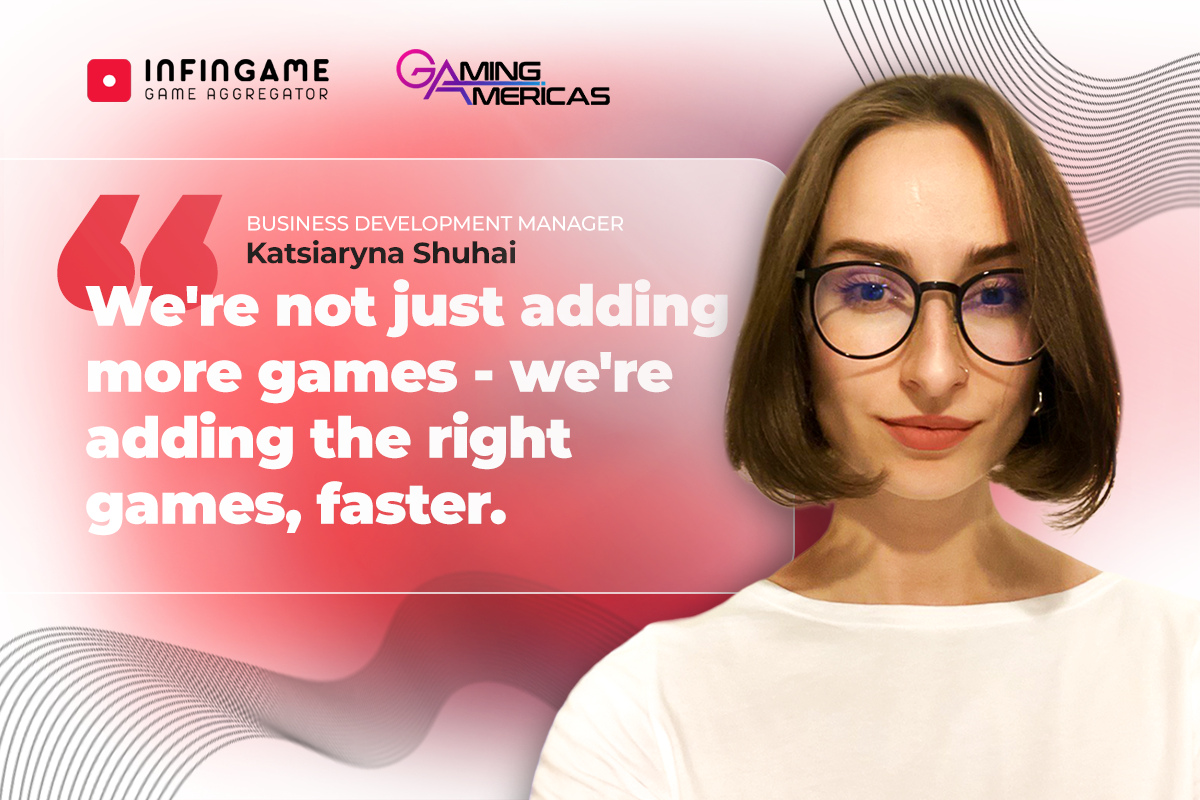
In an exclusive with Gaming Americas, Katsiaryna Shuhai, Business Development Manager at Infingame, explores how the supplier’s curated approach to casino content is redefining the games aggregation space.
Katsiaryna, can you begin by introducing yourself – what does your role at Infingame entail?
As the Business Development Manager at Infingame, I lead strategic partnerships and integrations with game studios and content providers. My role focuses on identifying standout gaming content that fits our platform’s vision, negotiating collaboration terms, and ensuring smooth onboarding.
With a background in advertising, I bring a strong focus on relationship-building, open communication and a personalised approach to each partner. I believe that genuine connections and tailored solutions are key to driving successful, long-term collaborations.
Infingame has recently integrated with innovative game studios, including TaDa Gaming and Popiplay. What factors influenced your decision to partner with these two studios in particular? How have they impacted your partners’ engagement and retention across Latin America?
Our decision to partner with TaDa Gaming and Popiplay was driven by each studio’s ability to deliver innovative, high-performing content that resonates with players across our key markets, including Latin America. Popiplay offers energetic, entertainment-led slots, while TaDa brings a diverse mix of popular formats such as crash and fishing games.
We’re confident that these integrations will help our partners boost player engagement and retention, particularly in Brazil, Mexico, and Colombia. Both studios align perfectly with our goal of delivering meaningful and localised content.
With 16,000+ games from 200+ providers available via Infingame’s platform, how do you ensure that new titles don’t just add volume but deliver real value to your operators?
While our platform boasts a vast library of games, we prioritise quality over quantity. It’s important to deliver content that we know players will enjoy, rather than just sheer volume.
When adding new content to our platform, each new title undergoes a rigorous evaluation process to ensure it meets our standards for player engagement, technical performance and market relevance. By focusing on curated content that aligns with operator needs and player preferences, we ensure that every addition enhances the overall value proposition for our partners.
Infingame is now taking a much more curated approach to game studio integrations. What sparked this change in strategy?
The shift towards a more curated approach stems from our commitment to delivering tailored, high-quality content that meets the specific needs of our operators and players. We want to make sure that the games on our platform are suited to local player behaviours, technical requirements and localised to each individual market.
As the iGaming industry continues to evolve, and more markets begin to embrace gambling regulation, it’s essential to focus on partnerships that offer strategic value, ensuring that each integration contributes meaningfully to our platform’s objectives and enhances the user experience.
With more selective onboarding of game providers, how does Infingame evaluate which studios to integrate with? What criteria do you consider?
We evaluate potential game studio partners using a rigorous set of criteria to ensure quality and compatibility with the Infingame platform. Key factors include the uniqueness and quality of game content, with an emphasis on standout mechanics, visuals and immersive experiences. Technical reliability is absolutely crucial – we assess API stability, integration efficiency, and overall tech performance to guarantee seamless operations.
We also consider the studio’s reputation and regulatory compliance across our target markets, ensuring that they meet legal standards and industry expectations. A strong track record of player engagement and retention is another important indicator of long-term value.
Additionally, we look for a clear commitment to innovation, including new formats or features that enhance the player experience. This selective onboarding approach helps us maintain a diverse, high-performing game portfolio that supports our operator partners and meets the evolving demands of players worldwide.
How will this refined integration strategy impact your existing and prospective partners, particularly in terms of content diversity and speed to market?
This refined integration strategy empowers us to deliver greater value to both existing and prospective partners by emphasising quality over quantity. By curating a portfolio of high-performing, innovative content, we ensure that our partners can offer games that genuinely resonate with their target audiences and stand out in a crowded marketplace.
Our focus on onboarding only top-tier, reliable studios means partners benefit from diverse and engaging content that drives player retention and growth. Additionally, by streamlining technical integration and reducing operational friction, we can accelerate speed to market, enabling our partners to launch new titles more efficiently and capitalise on emerging trends.
This agility is key to maintaining a competitive edge. Ultimately, our strategy is designed to foster long-term success for our partners by delivering not just more games – but the right games, faster.
Finally, what’s next for Infingame? Are there any upcoming partnerships, features, or innovations that you can give us a sneak peek of?
Looking ahead, Infingame is committed to expanding its portfolio through strategic partnerships with studios that deliver innovative, high-impact content. Our focus remains on curating games that not only entertain but also enhance player retention.
At the same time, we’re investing in new technologies and platform features – such as advanced tournament mechanics, real-time engagement tools, and personalised player experiences – to help our partners stay ahead of industry trends.
These enhancements are designed to drive deeper engagement, increase revenue potential, and strengthen the overall value we bring to our operator network as a trusted, forward-thinking iGaming aggregator.
Interviews
Sweepstakes’ next chapter: Exploring global potential, US regulations and player preferences

Sweepstake casinos have seemingly come out of nowhere to dominate the discourse across the US. We spoke to a number of providers who have entered the space to see what their expectations are, and how far the sweeps vertical can go alongside the traditional casino experience.
With/ Rory Kimber, Commercial Director at LuckyStreak, Daniel Mitton, Chief Business Development Officer at Sweepium and Allan Turner CEO at Cogniplay
What games are best received by sweepstake customers? Traditional games or more gamified titles such as boosted multipliers or big jackpot games?
RK: I would say that for live dealer, it’s a traditional genre of games that are popular with sweepstakes casinos players, and as we’ve seen, particularly Blackjack. US players are more likely to play in land-based casinos, so the authentic and human aspects of live dealer games naturally resonate well.
We’ve seen a big uptake of all our core games, which was gratifying, but that’s not to say the gamification aspect doesn’t play a role, as our leaderboards and tournaments are popular and very effective, particularly with this segment of players that are looking for more than just gameplay.
In slots it seems to depend on the brand; some operators bring in players who want traditional maths and features but an increasing number are seeing strong performance from new games with unique features that never lose your attention for a second. The providers that create games with sweepstakes players in mind will be more likely to see success.
AT: What we’re seeing is that players seem to lean towards games that feel quite traditional and familiar to them in most cases. Although, they often come with features like fixed jackpots that scale with your bet, which adds a bit more excitement to their playing experience. I would say that users are gradually getting more experimental over time, and as the prevalence of non-US based games providers increases on sweeps sites, with them applying the sweeps mechanic to their games, innovation is certainly speeding up, and this is being embraced by users.
DM: What we’re seeing from the U.S. audience is a clear preference for high-energy, feature-rich games. Titles that include interactive mechanics, boosted multipliers, or big-event style moments consistently drive the most engagement. These kinds of experiences are more immersive, more social and they give players a sense of momentum and excitement.
That said, traditional slots and classic-style games still play an important role especially as an entry point for new users. Over time, players really respond to content that feels fresh, dynamic and packed with surprises. It’s not just about spinning, it’s about participating in an entertainment experience.
Do you tweak titles to be unique to sweepstake casinos, or does the same product respond well on traditional online casinos and social?
AT: Right now, we mostly work with studios to handle any tweaks, though in general, the classic versions of games tend to perform well across different platforms. One area that we do see more interest in the sweeps market, is in things like fishing and shooting-style games, which have a real captive audience in the US, due to the history of fish table games in the market. One tweak that a lot of brands are employing is asking their game providers to create branded games for them, which in a lot of cases tends to perform very well, particularly for the more well-known brands.
RK: We tweak our games to be compliant first and foremost, but in terms of the actual gameplay in the Live games, it’s pretty much the same.
For social casinos in particular, there are necessary changes because the number of coins people win can be enormous, so that requires some thought too. For slots, we’ve seen our providers make sure the fastest gameplay settings are defaulted, along with all their features enabled that some regulated markets don’t allow, but really a lot of the time the gameplay experience is comparable.
That being said, providers who build sweepstakes and social titles from the ground up do go about things in a different way and have those players front of mind throughout the development process and that has been successful.
DM: We’ve found that the core product translates well across both traditional online and sweepstakes platforms especially when it comes to high-quality, well-designed games. The fundamentals of engaging gameplay, strong visuals and smooth mechanics resonate just as strongly with sweepstakes players as they do in real-money or social environments.
That said, there are subtle but important differences in how players engage. In sweepstakes, we tend to see more interest in longer session times, progress-based features and community-driven elements, which slightly shifts how we position and present the content. For example, boosted multipliers and timed events do especially well in the sweeps format because they align with that desire for ongoing entertainment and personal achievement.
Ultimately, a strong core game can succeed in both spaces. It’s about making the right adjustments to match player expectations keeping the experience fresh and engaging.
Do you think sweeps will become as popular throughout Europe as they are in the US?
RK: I think the elephant in the room is regulation. Sweepstakes are a popular product but are inextricably linked to what local regulation allows. For European markets where the real money industry has experienced stringent regulations I believe there is a space for sweepstakes casinos to come in and give players an experience more comparable to what they enjoyed a few years ago. I’m no expert on the legalities of sweeps in each of these jurisdictions but I’d be very surprised if they don’t gain a foothold in the European market somewhere.
DM: There’s definitely potential but the dynamics are different. In the U.S., the appeal of sweepstakes is closely tied to accessibility and the ability to engage across most of the country, on a state by state basis. That’s given the model a unique edge in the U.S. market.
In Europe, where the digital entertainment and gaming landscape is already well-established, the path might look different but I do think there’s room for growth, especially in areas where lightweight, low-barrier gaming experiences are in demand. The key will be localization, cultural relevance and regulatory framework. The model works best when it speaks directly to the habits and preferences of each market.
AT: Personally, I think it’s all about how market conditions change in Europe in the coming years, particularly with regards to regulation. In the US sweeps has become particularly popular because it has filled the void left by the fact there are still so few regulated states for real-money gaming. Does this void exist in Europe in the same way? Well, no, not in most countries, not now anyway. However, should regulators continue their current path to over-regulation, who knows how that will end up. There are already several sweeps’ sites operating in a few European markets, that are already quite over-regulated, and that trend could well continue apace.
Sweepstake casinos have shot to popularity in a swift time frame. Where do you think they’ll be in 5 years’ time?
AT: This is the billion-dollar question on everyone’s lips right now, with regards to sweeps, it’s certainly a question we get asked a lot! Obviously, there is a lot of noise about sweeps at the moment, and a huge number of variables to consider, and its’ anyone’s guess how it will all turn out in the end. Ultimately there is a huge demand in the US for online gaming products, and it seems logical, as part of free market economic theory that unless regulated gaming can progress much more quickly than it is now.
RK: Well again the obvious answer is what US regulators do – both in terms of the speed of opening up new states to online casinos, to how they respond to the growth of the sweepstakes sector. If things carry on largely the same I can see sweepstakes being at a similar level in terms of market share, perhaps even growing as more providers and new operators enter the market and improve the product offering.
I think overall it will be a balance, as certain areas in the US close off sweepstakes, other markets round the world will open up, so I see a steady path ahead on a global level – although perhaps not a repeat of the explosion we’ve just witnessed. Social is a different kettle of fish: I believe it will continue to grow rapidly and become linked in more interesting ways with the acquisition activities and loyalty programmes of real money gambling companies, whether they be land based or online.
DM: Looking five years ahead, I see sweepstakes platforms evolving into full-scale entertainment hubs. The future isn’t just about gameplay, it’s about creating connected, content-rich environments that bring together digital experiences, creator-driven events and community engagement.
We’re building platforms where people don’t just come to play, they come to interact, explore and be part of a larger digital culture. That could mean live-hosted experiences, interactive tournaments or even crossovers with music, sports or media. The sweepstakes format is incredibly flexible and that gives us the ability to adapt fast and scale with the culture. In short, we’re not just part of the digital entertainment world, we’re helping shape where it’s going next.
-
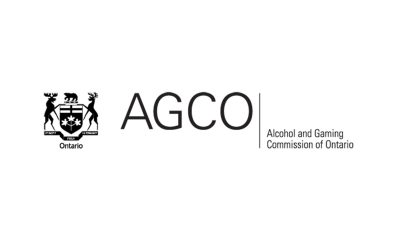
 Canada7 days ago
Canada7 days agoAGCO Fines Great Canadian Casino Resort Toronto $350,000 for Serious Regulatory Violations Linked to Impromptu After-Party on Gaming Floor
-
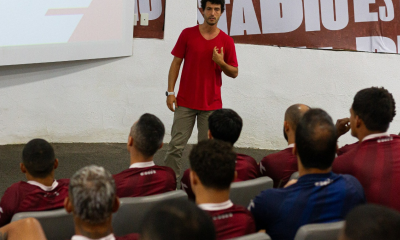
 Compliance Updates7 days ago
Compliance Updates7 days agoEsportes da Sorte holds forum on “Integrity in Sports” with Ceará and Náutico
-

 Latest News7 days ago
Latest News7 days agoBlokotech unveils Cristian Tonanti as new Casino Partnership Manager
-

 Latest News7 days ago
Latest News7 days agoEDGE Boost Named Preferred Payment Method for World Series of Poker Event Series
-
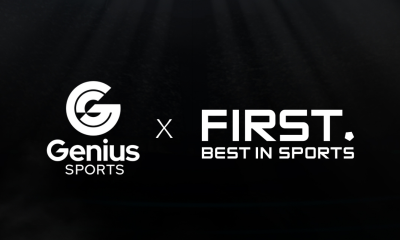
 Latest News7 days ago
Latest News7 days agoFIRST and Genius Sports Extend Landmark Data Partnership, Powering Continued Growth
-

 Canada7 days ago
Canada7 days agoIGT and Atlantic Lottery Sign Eight-Year Video Lottery Central System Technology Agreement
-

 Latest News6 days ago
Latest News6 days agoNASCAR & iRacing Renew Partnership with PlayVS
-

 Latest News4 days ago
Latest News4 days agoRivalry Reports Full-Year 2024 Results as Strategic Turnaround Takes Hold, Operating Loss Narrows, and Efficiency Improves


